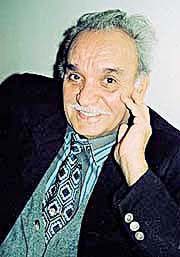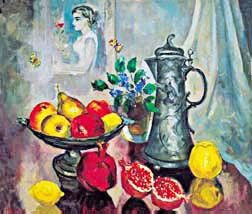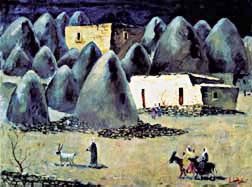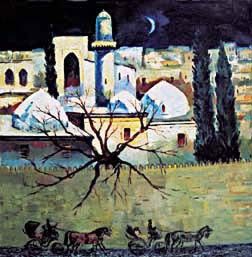|

Summer
1999 (7.2)
Pages
58-59
Elbey Rezaguliyev
(1927-
)
Optimism
as Fresh as a Rose
by Azad Sharifov
 There
must have been something in the air in the neighborhood where
Elbey Rezaguliyev grew up. It's as if the desire to create art
was contagious for everyone who lived there. Nearby was the home
of the famous Azerbaijani artist Azim Azimzade. Elbey remembers
that he and his father often visited Azimzade's home, and it
was there that Elbey's creative yearnings were first awakened.
Other artists were sprouting up all over the neighborhood-Javad
Mirjavad and his brother Tofig Javadov, Gorkhmaz Afandiyev and
Rasim Babayev-all of them very talented. There
must have been something in the air in the neighborhood where
Elbey Rezaguliyev grew up. It's as if the desire to create art
was contagious for everyone who lived there. Nearby was the home
of the famous Azerbaijani artist Azim Azimzade. Elbey remembers
that he and his father often visited Azimzade's home, and it
was there that Elbey's creative yearnings were first awakened.
Other artists were sprouting up all over the neighborhood-Javad
Mirjavad and his brother Tofig Javadov, Gorkhmaz Afandiyev and
Rasim Babayev-all of them very talented.
One important thing that these younger artists all had in common
was that they were veering off in artistic directions that did
not correspond with traditional painting styles or Socialist
Realism and that went counter to the directives of the Soviet
government. Elbey recalls how Javad's father used to say about
him and his group of friends, "You're all crazy. And you-you're
the king of the crazies." Here Azad Sharifov writes about
his April 1999 interview with Elbey, describing what has happened
since Elbey first got "infected" with art 60 years
ago.
_____
Elbey Rezaguliev grew up in a family of seven children. He admits
he was a rather disobedient and naughty child though it's hard
to believe. He remembers his father as being sick a lot of the
time. His father worked hard to make a living for them making
translations of Nizami and other poetic works including those
of Samad Vurgun's.
Elbey entered Baku's art school in 1940. Three years later his
father died, but Elbey says that the good people who surrounded
him eased the pain of his father's passing. His education continued
at Moscow's Cinematography Institute, where he studied under
Fyodor Bogorodski. Even though the entrance exams were very tough,
Elbey was exempted from many of them because his work was so
impressive.
  Luckily for Elbey, the
Cinematography Institute was much more progressive than many
of the other art schools in the Soviet Union. Students were not
cut off from new ideas and trends; in fact, many of the school's
professors had lost their jobs at other institutions because
they had fostered new directions in art. Bogorodski didn't discourage
his students from experimenting with styles such as Impressionism
and didn't like any interference from higher authorities on this
matter. Elbey was one of the first Azerbaijani artists to graduate
from the Cinematography Institute as a Director of Art for feature
films. Luckily for Elbey, the
Cinematography Institute was much more progressive than many
of the other art schools in the Soviet Union. Students were not
cut off from new ideas and trends; in fact, many of the school's
professors had lost their jobs at other institutions because
they had fostered new directions in art. Bogorodski didn't discourage
his students from experimenting with styles such as Impressionism
and didn't like any interference from higher authorities on this
matter. Elbey was one of the first Azerbaijani artists to graduate
from the Cinematography Institute as a Director of Art for feature
films.
Elbey Rezaguliyev, "Still Life With Fruit", 80 x
60 cm, oil on canvas, 1998.
One of his most memorable works was the film "Sevil",
which is a story about the emancipation of women in the East,
based on Jafar Jabbarli's play with music by Fikrat Amirov. In
the film, there is a famous scene that features ten canvases-silhouettes
of slender women covered in black chadors (veils) against gray
stone walls with no windows or doors. These canvases together
with the music made such a strong impression that when the film
was first shown, the audience burst out into applause.
During his study in Moscow, Elbey was waiting for Sevinj, the
beautiful girl he had fallen in love with, to become old enough
to get married. Eventually, he and Sevinj were married and had
two daughters. Elbey remembers Sevinj, who has since passed away,
as being an extraordinarily kind and patient woman. "Sevinj
was like a flower to me," he says. "There were often
evenings when I would sit up talking with artist friends until
early in the morning. She never complained; instead, she encouraged
those get-togethers."
 Elbey's
travels abroad have played an important role in his creative
development. During visits to countries such as Czechoslovakia,
Mexico, France, Japan and India, he met world-famous figures
such as Leopoldo Mendes, Luis Aragon and David Alfaro Sikeyros.
(Several years later, Sikeyros and his wife reciprocated the
visit in Baku.) Arabic motifs appear in some of the works inspired
by these travels, such as "The Castle", "The Mosque
of Omar in Jerusalem" and "A Village in Syria."
Perhaps most interesting is the series of portraits Elbey painted
during his trip to the enigmatic Nepal. Elbey's
travels abroad have played an important role in his creative
development. During visits to countries such as Czechoslovakia,
Mexico, France, Japan and India, he met world-famous figures
such as Leopoldo Mendes, Luis Aragon and David Alfaro Sikeyros.
(Several years later, Sikeyros and his wife reciprocated the
visit in Baku.) Arabic motifs appear in some of the works inspired
by these travels, such as "The Castle", "The Mosque
of Omar in Jerusalem" and "A Village in Syria."
Perhaps most interesting is the series of portraits Elbey painted
during his trip to the enigmatic Nepal.
Elbey Rezaguliyev, "A Village in Syria", 60 x 80
cm, oil on canvas, 1986.
Elbey has always shied away from official roles; he says that
he's a painter, not a politician. Once after Azerbaijan gained
its independence, someone suggested that he apply for nomination
to become a Member of Parliament, as is quite usual among Azerbaijan's
intellectuals-artists and writers. But he refused, insisting
that his vocation was painting, and that Parliament should be
represented by professional politicians. Another time, much to
his regret, he was elected secretary of Azerbaijan's Artists'
Union and was given the responsibility of allocating studio space.
As there weren't enough studios to go around, it was easy to
offend some artists. Somehow Elbey succeeded in resolving the
problem fairly, but he didn't like the headaches.
 Today,
Elbey prefers working at his country house in Pirshagi, rather
than dealing with the bustle of the city. There he paints tranquil
scenes like bathhouses abandoned in the sand, fig and pomegranate
trees as well as flat-roofed cottages with their cone-shaped
chimneys surrounded by cozy courtyards and fences. Inevitably,
these things will someday disappear from the landscape and will
exist only in Elbey's paintings. Today,
Elbey prefers working at his country house in Pirshagi, rather
than dealing with the bustle of the city. There he paints tranquil
scenes like bathhouses abandoned in the sand, fig and pomegranate
trees as well as flat-roofed cottages with their cone-shaped
chimneys surrounded by cozy courtyards and fences. Inevitably,
these things will someday disappear from the landscape and will
exist only in Elbey's paintings.
Elbey Rezaguliyev, "Inner City of Baku", 60 x 80
cm, oil on canvas, 1993.
These days, especially since his wife's passing, Elbey likes
to paint still lifes of flowers, often surrounding her portrait
with flowers on the canvas. Paintings of flowers are everywhere
in his house: white and red roses, carnations and poppies. They
seem so alive that you can almost smell them. "Flowers are
like human beings. I see human faces in them. I see them as living
beings and associate them with goodness and kindness," says
Elbey.
When asked what advice he would give to young people embarking
on a career of art, he replied: "Advice? There is so much
new breath, such fresh ideas, so many talented youth, I learn
from them."
Azad Sharifov is a frequent contributor to Azerbaijan International
and a personal friend of the artist for many years.
Jala Garibova also contributed to this article. Elbey Rezaguliyev
can be reached at (99-412) 98-75-08.
From Azerbaijan
International
(7.2) Summer1999.
© Azerbaijan International 1999. All rights reserved.
Back to Index
AI 7.2 (Summer 99)
AI Home
| Magazine
Choice | Topics
| Store
| Contact
us
|